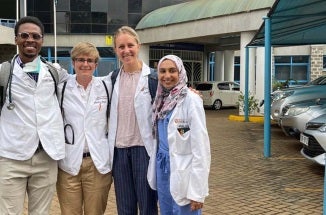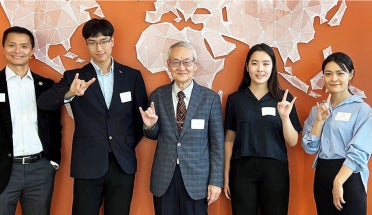
AMPATH Kenya Delivers Fulfilling Experience in Health Care
- Jul 20, 2022
- Global Initiatives
- by Alex Briseño
Maliha Khan, M.D., M.P.H., knew she wanted to pursue medicine at just 5 years old, long before she arrived in Kenya to complete a final global health rotation before graduating from The University of Texas at Austin.
For Khan, this passion for medicine runs in the family. Her father was a pediatrician in North Carolina where she grew up, giving her a front-row seat to his practice.
“I grew up around medicine and became very familiar with it as a career,” said Khan. “My dad owned his own practice, which is where I would go after school and on weekends. I grew up seeing medicine from a provider’s perspective and knew it was something I wanted to do.”
When she grew older, though, Khan faced a moment that made her question her future in medicine. When she was just a teenager, her father was diagnosed with cancer and passed away shortly after.
“I saw a completely different side of the health care system, and it was not a side that I appreciated,” said Khan. “I got exposed to medical errors, patient safety and quality concerns. It was a very long, confusing process.”
That process included looking into other career options. After arriving at The University of Texas at Dallas as an undergrad, Khan says, she explored numerous career paths. But ultimately, she decided that medicine was where her passion remained.
Finding “Something More” at UT Austin
After experiencing both sides of the health care system, Khan understood clearly which parts need fixing, pointing specifically to medical errors and physician burnout rates. As she searched for potential medical schools to attend, an aspect that stood out about Dell Medical School was its apparent willingness to address these shortcomings head-on.
“Dell's mission is to revolutionize health, and they want to produce students that understand health goes beyond pathophysiologic factors,” said Khan.
She continued, “My ‘thing’ wasn't necessarily just coming into medicine. If I’m going to become a doctor, I don’t want to just be a doctor. I need to be able to do more, and seeing that there was an option of potentially pursuing a career with quality improvement was that ‘something more’ that I was looking for.”
Going Farther with AMPATH Kenya
Another way Dell Med provided Khan with an opportunity to do “something more” emerged from a global health experience offered by the Academic Model Providing Access to Healthcare (AMPATH) program.
AMPATH’s history dates back three decades to when Indiana University and Moi University in Eldoret, Kenya, struck a partnership in 1990. This arrangement allowed Indiana’s faculty physicians to work with Kenyan colleagues, provide care to Kenyan patients and conduct health research, all while teaching medical students from Kenya and the United States.
Several universities in the U.S. expressed interest in the partnership after a decade of its continued success, resulting in the 2001 formation of AMPATH. In 2018, UT Austin joined the AMPATH Consortium, a global network of 14 universities aiming to foster long-term and equitable partnerships while coordinating a medical trainee exchange program in Kenya and North America.
AMPATH provides medical students and residents with practical, hands-on experience at Moi Teaching and Referral Hospital, one of Kenya’s national hospitals, which serves approximately 24 million people from Western Kenya and neighboring countries.
“One thing I appreciated with AMPATH is that it was established in 1990, and we could really see the impact of sustained global health across 30 years,” said Khan. “And it’s a bilateral exchange. A lot of the Kenyan medical students I interacted with did medical rotations at Brown University, and another is doing a rotation at Stanford in October. The fact that they can come and rotate here in the U.S. so that we can exchange knowledge is really special.”
Finding a Community Overseas
In March—on her first-ever trip to Africa—Khan arrived in Kenya for a four-week rotation in internal medicine. She described her first few days as “surreal,” adding that it took a couple of days to adjust, partially because the rotation overlapped with Ramadan.
“In addition to fasting from sunrise to sunset, I was also looking to connect with the Muslim community,” said Khan. “It’s a cherished month for worship but also community and family, and this was my first Ramadan away from home, so I was a little nervous.”
To her delight, Khan met numerous Muslim students from Kenya, all of whom ate dinner together and shared delicacies in what quickly became a communal atmosphere.
“That was actually really cool because it allowed me to be a part of Kenyan culture outside of the medical environment,” said Khan. “There really is something special about breaking bread with people. I cherish that experience just as much as I do the actual rotation. They were incredibly welcoming. It ended up being one of my favorite Ramadans ever.”
Fostering Collaboration Across Borders
During the rotation, Khan mentored fourth-year medical students and also collaborated with Ahmed Ali Dawood, a sixth-year Kenyan medical student. The two attended rounds together and provided care for the same patients at the Moi Teaching and Referral Hospital.
Dawood says it was Khan who mentioned how much UT Austin students benefited from didactics—an interactive method of teaching involving lectures and demonstrations—and came up with the idea to introduce them to Moi University. Together, they coordinated lectures on antibiotic stewardship and congestive heart failure with Dr. Hemali Patel, a faculty member in internal medicine at Dell Med, who supervised students in the AMPATH program.
“My whole rotation group of almost 50 students attended,” said Dawood of the resulting lectures. “Dr. Patel was the one presenting the lectures, but both were interactive sessions where we discussed cases and approaches to medical management. They were really good sessions! To date, we still talk about those lectures and how much they were of help to us.”
Remarkably, Khan noted, the group encountered a patient with congestive heart failure just one day after the lecture on that topic.
“One of the medical students referenced the lecture, and it reminded me that there is never something too small,” said Khan. “Even if it doesn’t feel like a major contribution, learning and exchanging information is a pretty big thing.”
For Dr. Patel, the beauty of AMPATH is that care “comes first, above and before any other potential opportunities that may arise from collaborative work.”
“Maliha was always intentional about her relationships and collaborations with the Kenyan team and learners,” continued Patel. “She incorporated their learning and educational needs into our practices and worked on creating a model of collaboration that aligns with the AMPATH mission. She also always kept a high level of cultural humility in engaging with her peers and worked to form meaningful relationships with her peers.”
Looking Forward to Lasting Impact
For just about her entire life, Maliha Khan has been interested in global health—she just didn’t know what that role would look like until she returned to Austin for graduation, reflecting on her four weeks in Kenya.
“There were a lot of emotions from this journey,” said Khan. “I've wanted this since I was a little girl. It just seemed like a distant dream for so long. And of course, my dad was a huge part of the journey, so the fact that he wasn’t there on graduation day was difficult.”
“But,” she added, “just coming back from Kenya and having that experience really shifted the way that I will see and practice medicine. I learned how to have a sustainable career in global health. There’s a lot to be proud of.”



